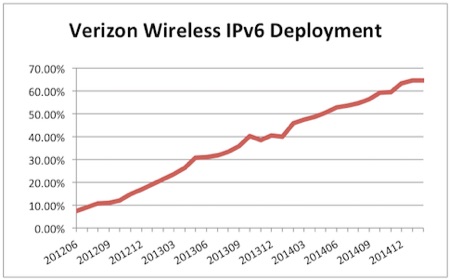Some amazing percentages of IPv6 deployment in the February 2015 World IPv6 Launch measurements. As I wrote about on the Deploy360 blog, Verizon Wireless now is showing 56% IPv6 deployment and T-Mobile USA just crossed over 50% IPv6.
 If you read the notes on the bottom of the measurements page you can see that Google, Facebook, Akamai, LinkedIn and Yahoo! are all measuring the amount of the amount of IPv6 they are seeing to their sites and reporting that back to the World IPv6 Launch project.
If you read the notes on the bottom of the measurements page you can see that Google, Facebook, Akamai, LinkedIn and Yahoo! are all measuring the amount of the amount of IPv6 they are seeing to their sites and reporting that back to the World IPv6 Launch project.
The key point for application developers is that all those people on those networks will be able to natively connect over IPv6 – if your application works over IPv6.
And a reason for caring may be… speed!
If a network is deployed with IPv6 in the main network, as I understand T-Mobile USA has now done, then connections from IPv6 clients can do directly to IPv6 servers. But connections to legacy IPv4 services will need to go through a gateway. Gateways typically introduce some degree of latency / delay, even at a microscopic level.
If your application works with IPv6 then you won’t need to worry about any v6/v4 gateways with any potential delays.
The reality that these measurements show is that IPv6 is very real today – will your app work over IPv6?
P.S. the goal of this book is to help! ![]()

